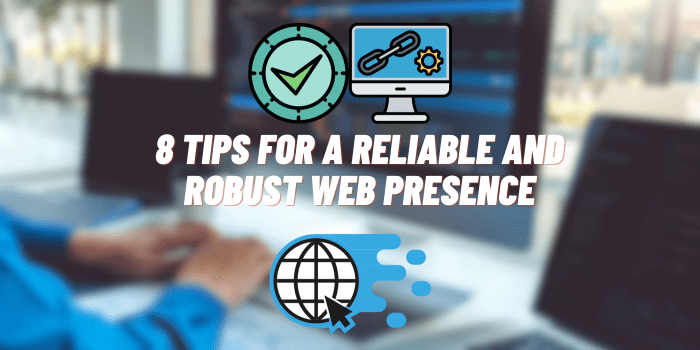8 Tips for a Reliable and Robust Web Presence
In today’s digital age, building and maintaining a robust web presence is crucial for businesses of all sizes. A strong online presence not only significantly boosts brand visibility but also serves as a powerful tool for customer engagement and retention. This guide provides eight tips to help your business create a reliable and robust web presence, ensuring that you stand out in the crowded digital marketplace.
1. Build a Professional Website

Your website serves as the digital storefront for your business, and as such, it should be professional, user-friendly, and aesthetically compelling. Invest in a clean design that reflects your brand, with easy-to-navigate menus and clearly displayed contact information. Ensure that your site is mobile-friendly, as a significant portion of web browsing now occurs on mobile devices. Incorporate interactive elements such as forms or chatbots to enhance user engagement and provide a seamless browsing experience. Additionally, consider implementing features like testimonials or case studies to build trust and credibility with your audience.
2. Choose Reliable Web Hosting
Opting for a dependable web hosting service is vital for your online presence. The right web hosting platform ensures that your website is accessible to users around the clock, thereby minimizing potential downtime that could negatively impact user experience and your brand’s reputation. When selecting a web hosting service, consider factors such as speed, storage capacity, scalability, and customer support. Additionally, it’s beneficial to choose a host that offers regular site backups for data security and recovery. Remember, a reliable web host is instrumental in providing a seamless online experience for your visitors.
3. Leverage SEO Techniques
Search Engine Optimization (SEO) is key to improving your website’s visibility on search engines. Incorporate relevant keywords into your content, maintain a blog to keep your website fresh, and ensure each page has meta tags and descriptions. Additionally, optimizing your website’s loading speed and mobile responsiveness can significantly boost your SEO ranking. Implement schema markup to provide search engines with structured data about your business, such as reviews and product information. Furthermore, consider conducting competitor analysis and staying updated on the latest SEO trends to stay ahead of the game.
4. Engage in Social Media

Social media platforms are a powerful tool for increasing your online presence. Regularly post engaging content and respond to comments and messages in a timely manner to foster a sense of community. Different platforms cater to different demographics, so choose your platforms wisely based on your target audience. Consider running social media campaigns or partnering with influencers to expand your reach and attract new followers. Moreover, leverage social media analytics to measure the effectiveness of your efforts and refine your strategy accordingly.
5. Develop a Comprehensive Content Strategy
A strong and well-planned content strategy is fundamental to maintaining an active and engaging online presence. This includes consistently creating and sharing a variety of content formats such as blog posts, infographics, videos, and e-books. By producing high-quality and valuable content, you not only drive traffic to your website but also establish your business as a trusted thought leader in your industry. To ensure that your content resonates with your target audience, conduct thorough keyword research to identify popular topics and emerging trends. By addressing the needs and interests of your audience, you can cultivate a loyal following and encourage engagement. Additionally, consider repurposing your content across different platforms and formats to maximize its reach and impact.
6. Harness the Power of Email Marketing
Email marketing is a highly effective tool for directly connecting with your target audience and promoting your products, services, and events. To maximize the effectiveness of your email campaigns, develop a comprehensive strategy that includes segmenting your subscriber list and personalizing your messages based on customer preferences and behaviors. By tailoring your emails to specific segments of your audience, you can deliver more relevant and engaging content. Additionally, incorporate visually appealing designs, compelling copy, and clear call-to-action buttons to encourage recipients to take action. To continuously optimize your email marketing efforts, consider implementing automated email workflows and conducting A/B testing to identify the most effective strategies for driving engagement and conversions.
7. Enhance Your Reach with Online Advertising
While organic growth is important, investing in online advertising can significantly expand your reach and visibility. Platforms like Google AdWords, Facebook Ads, and Instagram Ads offer powerful targeting capabilities that allow you to reach specific demographics and track the success of your campaigns through detailed analytics. To ensure the success of your online advertising efforts, conduct thorough market research to identify the most effective advertising channels for your business. By optimizing your campaigns based on the insights gained from your research, you can achieve maximum return on investment. Moreover, consider utilizing retargeting techniques to reach potential customers who have previously shown interest in your products or services. This can help you stay top-of-mind with your target audience and increase the likelihood of conversions.
8. Monitor Your Online Reputation

In today’s digital landscape, maintaining a positive online reputation is essential for businesses. Regularly monitor reviews on platforms like Google, Yelp, and Facebook, and respond to any negative feedback in a professional and timely manner. Encourage satisfied customers to leave detailed reviews to boost your online reputation, and consider implementing a reputation management system to streamline the process. Actively engage with online communities and address any customer concerns to demonstrate your commitment to customer satisfaction. Additionally, keep an eye on social media mentions and utilize social listening tools to stay informed about conversations related to your brand. This level of detail and proactive approach will help you effectively manage and maintain a strong online reputation.
Establishing a robust and reliable web presence is no longer optional in today’s digital age. It’s a fundamental requirement for any business aiming to thrive in the digital marketplace. By implementing these eight strategies, including building a professional website, leveraging SEO, engaging in social media, developing a content strategy, harnessing email marketing, exploring online advertising, and monitoring your online reputation, you can significantly boost your online visibility. It’s a continuous process that requires regular monitoring, analysis, and adjustment. However, the effort invested in maintaining a strong online presence is always worthwhile as it ultimately contributes to the growth and success of your business.






